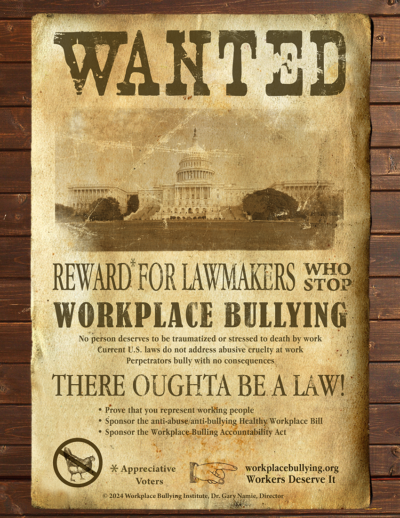
WBI Healthy Workplace Bill
To Prevent & Correct Abuse at Work
This is the official home of the inaugural national grassroots movement to enact the anti-bullying Healthy Workplace Bill (HWB) in U.S. states. Its goal is to prevent and correct abusive work environments in American workplaces (see Features below). Our work began in California, the first state to introduce our bill in 2003.
The HWB is the boldest proposed change to U.S. employment law in 50 years. Current discrimination and harassment laws rarely address bullying concerns. Though bullying is more harmful to victims’ health than sexual harassment, it is still legal in the U.S. People deserve more protection against arbitrary cruelty than existing nondiscrimination laws afford.
Suffolk University Law Professor David C. Yamada, an employment law specialist, wrote the HWB. The Workplace Bullying Institute (WBI) network of volunteer citizen lobbyists has successfully had the bill introduced throughout the U.S. The map below charts the history and progress of the HWB movement since 2003 as it has been effectively opposed by the well-funded business and human resources (SHRM) lobbyists.
In 2025, Prof. Yamada wrote a second piece of proposed legislation — the Workplace Bullying Accountability Act (WBAA) — as an alternative approach to address the destructive phenomenon. Its purpose is to create an employer’s Duty of Care to safeguard its employees from workplace bullying. The bill is described here.
Details about the Workplace Bullying phenomenon can be found at the WBI website.
Features of the Healthy Workplace Bill
For Bullied Employees (Plaintiffs)
- Public lawsuits allow details of employer misconduct to be aired without gagging or suppression
- Plaintiffs can be anyone, not just “protected status group” members as discrimination and harassment laws require
- “Workplace bullying” is replaced with abusive workplace conduct, so as not be discounted or trivialized
- This would be a civil lawsuit. It’s about money for harm.
- Plaintiffs can show that they were distressed and suffered harm (happens in all cases of genuine bullying)
- Harm can be health, adverse employment actions or constructive discharge
- Plaintiffs may sue employers (with insurance to cover their costs) for exposure to a harmful work environment
- No workers comp claim if lawsuit is filed (except in Wisconsin where both are permitted)
- Retaliation for filing the lawsuit is also a violation
- If plaintiffs win, relief may include: reinstatement or bully removal, back pay, compensation for pain & suffering, back pay, front pay, compensation for emotional distress, punitive damages and attorney’s fees
For Good Employers
- If “reasonable care” to prevent & correct abusive conduct (meaning the creation of a relevant policy and enforcement procedures) is taken AND the employee fails to take advantage of the policy, the employer escapes (vicarious) liability
- Employers still have right to act on actual poor performance or investigated illegal or unethical activity by the employee
- In the absence of an adverse employment decision (termination, demotion, failure to promote, discipline, reduction in compensation), employers can only be liable for emotional distress damages if misconduct was extreme and outrageous
- Plaintiffs may choose to sue perpetrators who may only escape liability if they prove they acted at the direction of the employer under actual or implied threat of an adverse employment action
32 States Have Introduced the HWB
The purple states have previously introduced the HWB. The dark blue states have passed training-only mandates for all employers (California) or state-only employers (Utah).
In the 2025-26 two-year legislative session, the HWB is active in New York. States with currently active bills are GREEN. Click on these states to see the current status and names of sponsors.
2025
On Jan. 14, 2025, in New York, S1893 the HWB was introduced and referred to the Senate Labor Committee. Names and contact info for all Sponsors and Committee members can be found on the WBI Legislative Activity record page.
WBI added the new Workplace Bullying Accountability Act (WBAA) to our proposed legislative campaign.
On Jan. 17, 2025, in Massachusetts, SD 1853 the WBAA was introduced. Names and contact info for all Sponsors and Committee members can be found on the WBI Legislative Activity record page.
On Feb. 24, 2025, in West Virginia HB 2857, the WBAA, was introduced. Names and contact info for all Sponsors and Committee members can be found on the WBI Legislative Activity record page.
How Volunteers Can Get Involved
New 2025 WBI training on How to be an Effective Citizen Lobbyist
only for registered State Coordinators and Citizen Lobbyists. Go here to sign up.
Beginning in 2025, WBI advocates will be asking state lawmakers to sponsor the new
Workplace Bullying Accountability Act (WBAA). It is described here.
Puerto Rico Enacts
First Workplace Bullying Law in the U.S.
On Aug. 7, 2020, the PR governor Wanda Vázquez Garced signed into law “Act to Prohibit and Prevent Workplace Harassment in Puerto Rico” (House Bill 306). Without doubt, this law is the closest to the WBI Healthy Workplace Bill that has been introduced in 31 other U.S. States. “Workplace harassment” is defined as malicious, unwanted, repetitive and abusive, arbitrary, unreasonable and/or capricious behaviors by employers, his (sic) agents, supervisors or employees oblivious to the employer’s legitimate business interests that create an intimidating, humiliating, hostile or offensive work environment not suitable for a reasonable person to perform their duties or tasks in a normal manner. One corporate employment law firm said the bill passed despite strong employer resistance. State lawmakers should find the same courage the PR lawmakers did. Ignore whiny employers who think they have to bully to manage.
